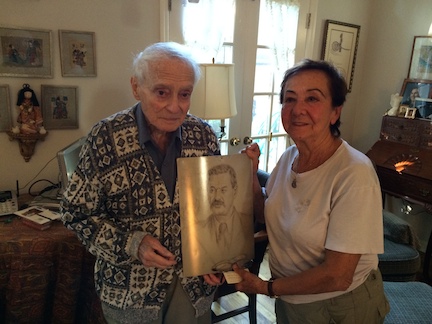Jul 2014
Dr. Aron Szulman talks about his father, Jakub Szulman (1889-1942)
17 July 2014
 Interview about Jakub Szulman
Interview about Jakub SzulmanIn this statement, Dr. Aron Szulman talks in English and then in Polish about Lejzerowicz’s drawing of his father, Jakub Szulman, the lay director of Ghetto Hospital #2 (Drewnowska / Holzstrasse 75). Jakub Szulman, born in Kremenchuk, central Ukraine in 1889, left that part of the Russian Empire for the Polish lands before World War I. Szulman was a socially committed journalist, Zionist, and community leader. Growing up in Kremenchuk, his family spoke Russian and Yiddish; he learned Polish after he moved to Poland. Jakub Szulman came to Łódź following the lead of his sister, who had studied at the school for midwives in Warsaw and got a job in Łódź. Jakub Szulman was a person of significance in Łódź, especially in the Jewish community. In addition to his other accomplishments, Szulman was a founding member in 1925 of the YIVO Institute for Jewish Research (Yidisher visnshaftlekher institut), then based in Wilno, Poland (now Vilnius, Lithuania). Lejzerowicz made this drawing of Jakub Szulman on paper in 1940; it is preserved in the Jewish Historical Institute’s art collection in Warsaw (A-888/20). The inscription on the drawing reads: “Panu J. Szulmanowi w dowód serdecznej przyjaźni” (to Mr. J. Szulman as a proof of sincere friendship).
Jakub Szulman’s death in January 1942 came as the result of a heart condition. In a notice about Szulman’s death, the ghetto chroniclers give a sense of the man’s character and his importance in the community:
“On January 2, Jakub Szulman, aged 52, well-known in Jewish society as a socially active and indefatigable civil leader in Łódź’s Jewish life, departed this world in the prime of his life. Szulman, of blessed memory, enjoyed the same trust and universal respect in the ghetto as he had in pre-war Łódź. Until the last moments of his life he held the important position of chief of Hospital No. 2 on Drewnowska Street. Due to his uncommon abilities and selfless perseverance, the deceased distinguished himself in organizing life in the ghetto, which earned him the fullest appreciation of the ghetto’s leader and of everyone who worked along with him. Among other things, the ghetto owes the creation of the building superintendents’ system and successes in the field of hospital management to the initiative of the decreased. Szulman, of blessed memory, was one of those rare people of whom all, without exception, can speak only in superlatives. Ghetto society has lost an extremely useful, righteous, and noble man of great merit. . . . Hundreds of people from all walks of life, as well as Chairman Rumkowski, took part in the funeral ceremony. The deceased is survived by his wife and son.”
[The Chronicle of the Łódź Ghetto 1941-1944, edited by Lucjan Dobroszycki, translated by Richard Lourie and others, New Haven/London: Yale University Press, 1984, pp. 109-110; this section of the chronicle was originally written in Polish.]
After anti-Semitism prevented him from being admitted to study medicine in Lwów (now Lviv, Ukraine), Aron Szulman left Poland in 1938 to study in England, first at Harrogate (Yorkshire), then medicine at the University of Birmingham. He was one of several young Polish-Jewish men from Łódź who went to England to study. Szulman’s wife Irene is a survivor of the ghetto of Łódź, having lived at Bazarna 1 during the ghetto period, close to Lejzerowicz’s studio at Rybna 14A; she did not know the artist. The couple met in Boston after the war and make their home in Pittsburgh, Pennsylvania, where this interview was recorded in July 2014. (3:17)
I am sorry to report that Dr. Aron Szulman passed away on 22 November 2014.